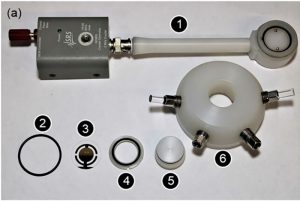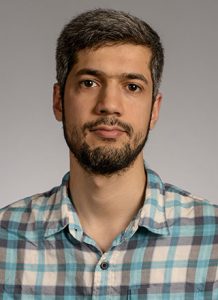
June 30, 2021
Mizzou Engineer solving complex problems during internship at Arm
A Mizzou Engineering student is conducting an internship this summer at Arm, a leading semiconductor and software design company. Specifically, Arun George Zachariah is designing frameworks to optimize the complex workloads involved in infrastructure research using multi-core Arm processors.

June 29, 2021
Designing new ways to understand material
A Mizzou Engineer has designed two techniques for understanding the behavior of materials. The discoveries could be a game-changer for material scientists working to improve batteries and other technologies.

June 28, 2021
Using blockchain to streamline supply chains
A Mizzou Engineering researcher is part of team proposing a new way to use blockchain technology to streamline supply chains. Blockchain is a decentralized database that allows multiple stakeholders to access and share information in a secure, transparent manner. Users can provide information to the decentralized database; however, they cannot tamper with data once it is recorded. While others are investigating ways to incorporate it into supply chain systems, the team’s proposal is unique in that researchers studied multiple aspects of the process from a cloud computing perspective, said Praveen Rao, an associate professor with joint appointments in Electrical Engineering & Computer…

June 16, 2021
Improving water turbulence modeling to tackle invasive carp
Assistant professor Binbin Wang A Mizzou Engineer is helping develop new river turbulence modeling capabilities in hopes of determining potential spawning locations for invasive carp. Assistant Professor Binbin Wang in civil and environmental engineering (CEE) is teaming up with the U.S. Geological Survey’s Columbia Environmental Research Center (CERC) on the project. “We want to be able to control these fish,” said Duane Chapman, supervisory research fish biologist with CERC. “We have previously partnered with physical scientists that are good at modeling fish-egg transport. That’s important because these carp spawn in rivers only. We’re hoping Dr. Wang’s new model will improve our ability to…

June 15, 2021
Mizzou Engineer Offers Tips on Preventing Ransomware Attacks
By Eric Stann, MU News Bureau Prasad Calyam The recent ransomware attack on a major oil refinery in the United States, followed weeks later by another hack that affected a large meat supplier, have again brought the issue of cyberattacks to the forefront of people’s minds, followed closely by a renewed push toward building better cyber defenses to help prevent critical data from being stolen and held hostage by cybercriminals. Furthermore, these attacks have caused a ripple effect in the nation’s economy, most notably with sudden rises in gasoline and food prices, gasoline shortages and delays with shipping and…

June 14, 2021
Meet Noah Manring
Noah Manring What does it take to be an effective leader? Management skills? Of course. The ability to solve problems? Absolutely. A Mizzou Engineering education? Turns out, that’s proven to be key for hundreds of CEOs and managers. Meet Dean Noah Manring, who’s on a mission to ensure the College continues that long-standing tradition of graduating C-suite professionals. It’s not unusual for engineers to hold top positions. Google, Amazon, Microsoft — all founded and led by engineers. That’s true of non-tech companies, too: General Motors, Exxon Mobile, even a former CEO of McDonald’s started as an engineer. But Mizzou Engineering has…

June 9, 2021
Mizzou Engineers Take Transfer Learning Step Further in New Paper
Imagine having a self-driving car that is already trained to recognize road markings, street signs and other vehicles. Could you take what that car knows and tweak it so the vehicle could navigate the ocean, too?

June 7, 2021
Meet Hongbin ‘Bill’ Ma
Imagine having a two-sided lunchbox that could keep your soda cool all day while also heating a can of soup at lunch. Or a temperature-controlled swimming pool that allowed you to swim in November. What about a high-tech beach umbrella that could keep you 15 degrees cooler than the air around it? Sound like a futuristic utopia? Meet Hongbin “Bill” Ma. Ma is professor and chair of the Department of Mechanical and Aerospace Engineering at Mizzou Engineering. This past year, he was elected a Fellow by the National Academy of Inventors — a highly prestigious honor bestowed on just 1,400 scientists around the world.

June 1, 2021
Nassar awarded NSF CAREER grant to explore mathematics of deployable structures
Assistant Professor Hussein Nassar recently received the prestigious National Science Foundation (NSF) Faculty Early Career Development Program (CAREER) grant for his work on identifying unifying mathematical models that can explain the behavior of deployable structures. Research into these morphing metamaterials could aid in the designs of airbags, clothing, and even solar panels for space travel.

May 28, 2021
Engineering Professor’s Company One of Three Startups Recognized at Mizzou Event
Mizzou Engineering faculty were recognized last month for taking their research ideas to market.